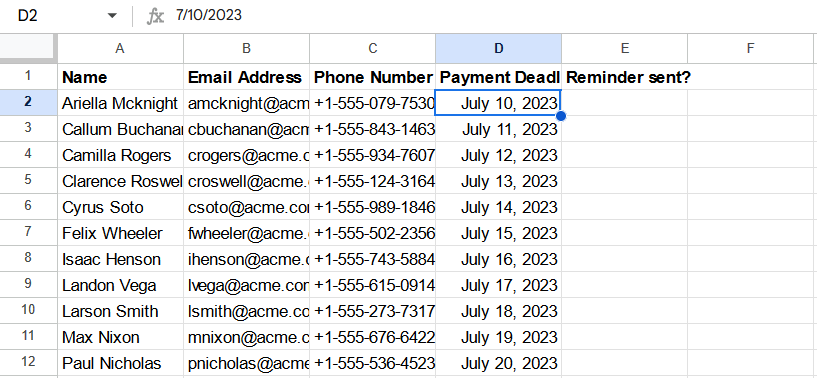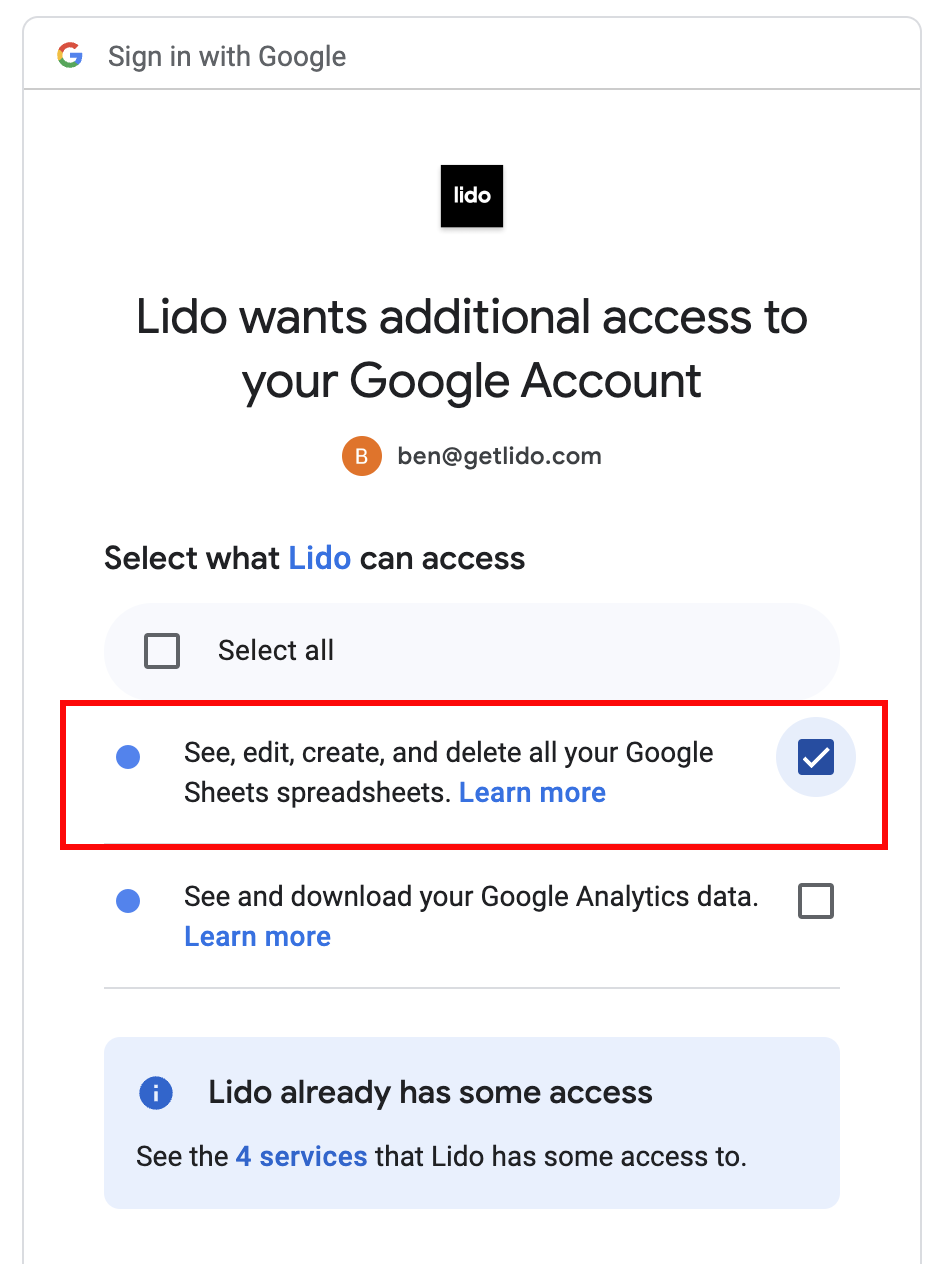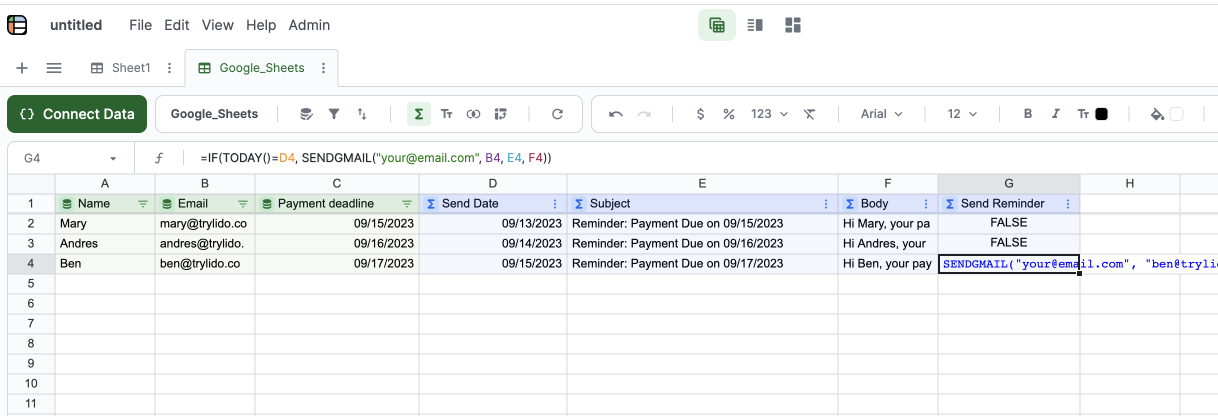Perhaps you've got a team requiring a weekly update via email, or you simply need a recurring email reminder for yourself every day, week, or month. While there is no native reminder function in Gmail, you can easily connect your Gmail account to Lido and send automated reminder emails in a few simple clicks.
If you don't have a Lido account, you'll need to create one for free at: https://www.lido.app/go/signup
Lido is a spreadsheet that automates work for you by connecting spreadsheet data to email. In order to send automated reminder emails, we'll need to input some information like who we want to send the emails to, on what dates, and what the emails should say. If you already have this data in a Google Sheet, you can skip to step 2. Otherwise, continue here to input your email data into Lido.
Make a table out of your data. You should have 1 row per reminder email that you want to send. If the automated reminder emails will be sent to a different recipient for each row, then include the email recipient in your table (column C in the example below). Otherwise, if you want to email the same people (e.g. yourself or your team) then leave this out.

Select the range, then right click and select "Convert Table from Range."
.png)
Name your table and click save.
Skip ahead to Step 3.
Skip this step if you added a table already in step 1. Otherwise, if you already have the data that you want to use to send automated email reminders to in a Google Sheet, then you can connect the Google Sheet directly to Lido.
Make sure your Google Sheet is formatted like our sample sheet here. The data should be in a contiguous table, with no empty rows or columns. Column headers (Name, Email Address, etc.) should be in the first row and contain no special characters or line breaks.

Copy the URL for your Google Sheet. We'll need this to connect your spreadsheet to Lido.
Create a new file, then click on the green Connect Data button.
.png)
Select Google Sheets, then paste your Google Sheet URL into the text box. You'll be asked to connect to your Google account if it's your first time connecting a Google Sheet to Lido.
.png)
You will be asked to login to a Google Account that has access to the Google Sheet the first time you connect. Make sure to check this box to give Lido permission to access your Google Sheets.

Next, select the columns that you want to add to connect to Lido. Then click Add Data.
Note that if you rename or delete these columns, the connection to Lido will break. If this happens, click on "Edit Data" and you can reselect the correct fields.
.png)
If you have a table of data in Lido, you're ready to continue. Otherwise, go back and either add the data directly to Lido or connect a Google Sheet.
Reminder emails should be sent ahead of a deadline. For our example, we will send reminders two days before the deadline. The formula is straightforward:
reminder_date=deadline_date - 2
Where deadline_date is the cell containing the deadline date. If the deadline is stored in column C, then the deadline of the first listed entry will be in C2. The formula becomes
.png)
Hit enter to create a computed column. This is a special column type in Lido that will automatically apply the same formula to every row in the column. This is particularly useful if you add more records to your Google Sheet or to the bottom of your table, since the formula will be applied to the new rows automatically.
We can name this column Send Date
.png)
We are now ready to add the subject and body of the reminder email.
First we will create templates using our table column names as variables by referring to them with [@Column] syntax.
Set up templates for email subject and body in a new worksheet like this:

Now we need to combine these templates with our table data in the other tab to make the email content dynamic. We'll do that by creating two new computed columns for both Subject and Body. We will use a formula called STRINGTEMPLATE() inside of a computed column to do this.
First, make a new computed column and name it Subject.

Add this formula to row 2 in the Subject column:
In our example, Sheet1!$B$1 is the location of our subject email template. Make sure you replace this with your own cell location if it is different, otherwise the formula will not work. Also, remember to anchor the cell reference with $, as all rows will use the same template cell.
You should now have a subject column that looks like this. Notice how the payment deadline is different for each row based on the values in column C.

Now do the same thing for email body. Make another computed column. Then apply the formula below. Remember to change the cell references to match your sheet.
You now will have something that looks like this:
.png)
Lido's spreadsheet has a special type of formula called Action formulas. These are formulas that can send data externally but need to be triggered to run. Action formulas don't calculate immediately when you type them (as normal spreadsheet formulas do). You need to explicitly run them manually or with an automation. One action formula is SENDGMAIL, which lets you send an email directly from your spreadsheet.
SENDGMAIL works as follows:
=SENDGMAIL(sender, recipient, subject, body, [status_cell], [cc], [bcc], [attachments])
Where:
sender - a credential you create for your@email.com (This should be associated with a Gmail or Google Apps account)
recipient - the email of the user that will receive the reminder
subject - the email subject
body - the email body
Our core SENDGMAIL formula looks like this:
If we want to have SENDGMAIL display only when today's date is the reminder send date, then we want to add an IF statement:
=IF(TODAY() = reminder_send_date, SENDGMAIL(sender, recipient, subject, body))
The formula works as follows:
If today's date is equal to the reminder_send_date, then display the SENDGMAIL formula, otherwise display FALSE.
Let's create a new computed column, and enter our formula below in row 2 (remember to adjust the formula for your data). We can double click on the header cell, and rename the column to Send Reminder.

As you can see, the SENDGMAIL formula is only visible for dates when Send Date = Today. For all other days it displays FALSE.
Right click on the SENDGMAIL formula and click "Run Action" to send the email. You will be asked to authenticate into your Gmail account the first time that you send an email from Lido.

Now, we can automate the running of the Send Reminder column. For rows where SENDGMAIL displays in the column, Lido can automatically run them once per day, even if the file is closed.
Click on your Send Reminder column menu and select Run column on a schedule.

Select what time of day you want your messages to send, then click save.
.png)
Now, every day at 1:15PM (or whatever time you've selected), Lido will pull in the latest records from your Googlle sheet, automatically check and see if there are any reminder emails that need to be sent where TODAY = reminder_send_date, and if so, run the each SENDGMAIL formula and send the emails.

Impressed? Click here to get started with Lido!
Easy. In the Step 3 above, just change the number in the formula. For the example that we use, we have the following formula:
=C2-2
This will send the reminder two days before the deadline. To send the reminder a week before the deadline, just change the number to 7 (7 days):
=C2-7
If instead you want to send the reminder 3 days before the deadline, just change it to 3:
=C2-3
And so on.
You can check if the formula works first before setting the automation settings. First, change the sender_email and recipient_email to the one you can open. Afterwards, click the cell containing the formula for sending reminder emails. Then, click right click on the SENDGMAIL formula and select Run action.

Lido will run the formula. If the formula has no errors, the message Action run successfully will appear on the lower-right corner of Lido.

You can also send reminders a few times at different times to the same user. You just need to repeat the Steps 3 to 6, adding a set of columns for each instance.
We hope you now have a better understanding of how to send automated reminders. If you enjoyed this article, check out our article on how to set up bulk email from google sheets or send email based on a date in google sheets.